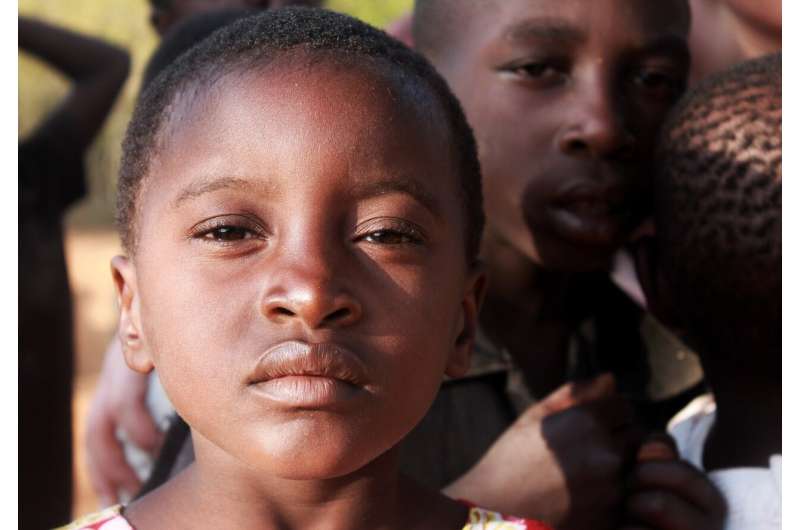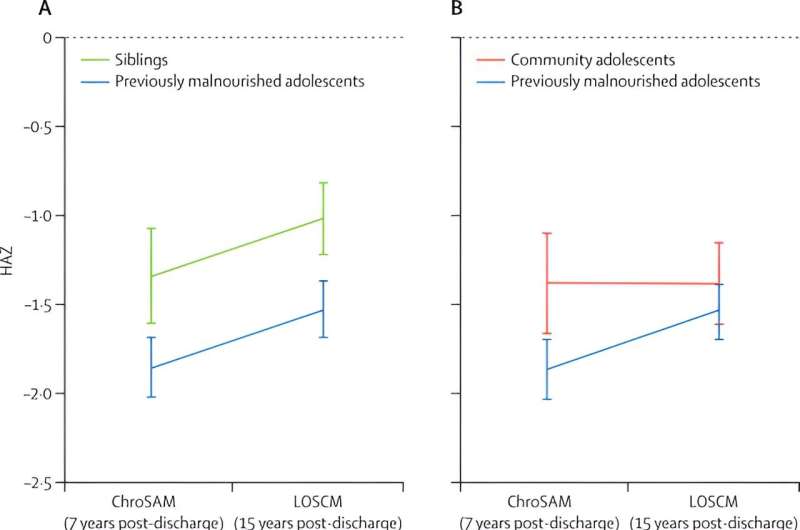This article has been reviewed according to Science X's editorial process and policies. Editors have highlighted the following attributes while ensuring the content's credibility:
fact-checked
trusted source
proofread
Researchers investigate long-term outcomes after severe childhood malnutrition

New findings from one of the few studies reporting long-term health outcomes for children with severe malnutrition were published on February 15, 2024, in The Lancet Child and Adolescent Health. The paper is titled "Long-term outcomes after severe childhood malnutrition in adolescents in Malawi (LOSCM): a prospective observational cohort study."
This prospective cohort study followed a group of Malawian children for 15 years after their treatment in hospital for severe childhood malnutrition. The study compares the health outcomes of this group (now in their teenage and young adult years) to their siblings and peers of a similar age from their communities who did not have severe malnutrition as children. Researchers call for action to save lives short-term, and ensure the long-term health, development and well-being of children who have survived episodes of early-life malnutrition.
Very few other studies have been able to track a vulnerable group such as this over such a long time period. With malnutrition currently in the news in numerous countries and the topic receiving significant attention following the July 2023 release of new World Health Organization (WHO) Guidelines on malnutrition, the project is especially timely and important.
The researchers, led by the University of Liverpool and working in partnership with a number of collaborators including the London School of Hygiene & Tropical Medicine, the Malawi-Liverpool Wellcome Trust Clinical Research Program and the Kamuzu University of Health Sciences, Malawi, followed up and investigated the health outcomes of 168 adolescents with previous severe childhood malnutrition, alongside 123 siblings and 89 adolescents from the community without previous severe malnutrition.
Findings
Overall, the researchers summarized that a very high number of those with severe childhood malnutrition died in the years after discharge from care, and survivors had persistent negative effects of lower height and possible lower strength compared to those without previous severe malnutrition. However, survivors exhibited "catch-up" growth in childhood and beyond, which provides optimism for ongoing recovery of height deficits after treatment.
The researchers suggest these findings highlight the importance of supporting the nutrition, health, and well-being of those with severe childhood malnutrition after discharge from care, and the need to address adverse life circumstances throughout early childhood and adolescence.

The London School of Hygiene & Tropical Medicine's Dr. Marko Kerac said, "While we were happy to see that the health and growth of our survivors of child malnutrition from 2006/7 seems to be catching up with sibling and community peers, it is vital to see these results in context.
"Over 1,000 children were initially admitted to our severe malnutrition treatment program. Many died in-program and in the months and years after. It is thus particularly tragic that the world has not moved forward much since that food crisis 15 years ago. With climate crisis and conflict, there are millions of children who even today suffer from hunger and malnutrition.
"Urgent action is needed, not just to save lives short-term, but to ensure the long-term health, development and well-being of any survivors. Prevention and treatment of child malnutrition must never be seen as a cost but as an investment for the future of individuals, societies and entire countries."
Lead researcher, Dr. Amir Kirolos from the University of Liverpool and Malawi-Liverpool-Wellcome Trust said, "Prevention, early identification, and treatment of severe childhood malnutrition saves lives. Our study shows the importance of addressing other adverse factors alongside treatment for severe malnutrition. Poverty, hunger, and living with HIV were common in our study and affect too many children and teenagers in Malawi and worldwide.
"We need further research and investment to tackle these adverse factors and all forms of child malnutrition. This will allow affected children to not only survive, but thrive, reaching their full potential in the long-term."
Next steps
Although this cohort did not find strong evidence of impaired cognition or higher cardiometabolic disease risk, the group is still young and the researchers recommend that further research in Malawi and across other settings is needed to better understand long-term health risks as they grow into later adulthood.
Further investigation and investment into improving home and life circumstances of those with adversity is needed to improve the long-term health outcomes of millions of children worldwide currently suffering from malnutrition.
More information: Amir Kirolos et al, Long-term outcomes after severe childhood malnutrition in adolescents in Malawi (LOSCM): a prospective observational cohort study, The Lancet Child & Adolescent Health (2024). DOI: 10.1016/S2352-4642(23)00339-5
















